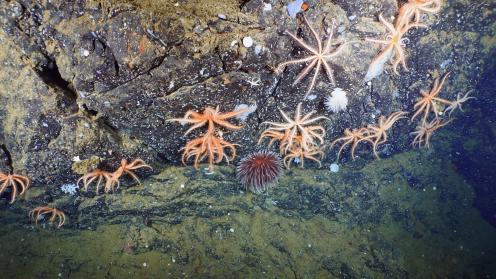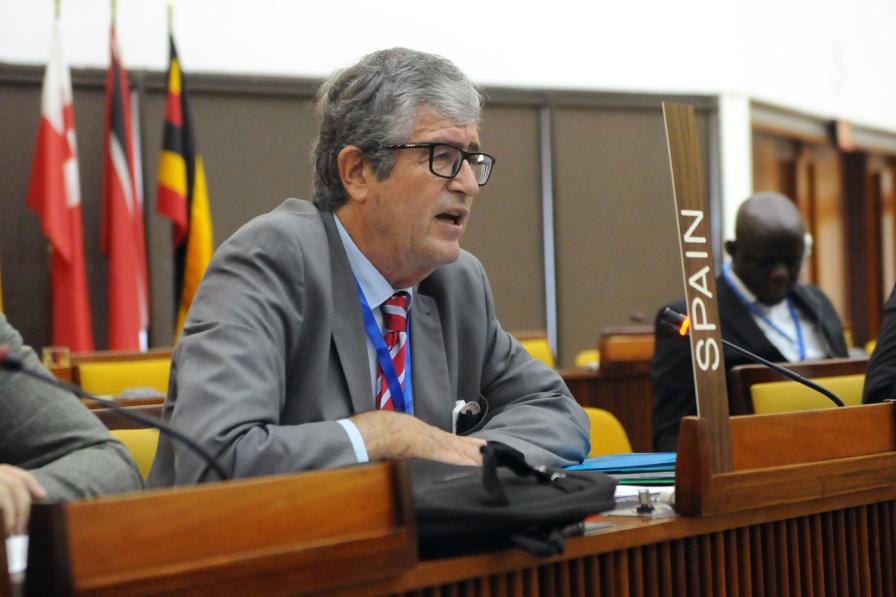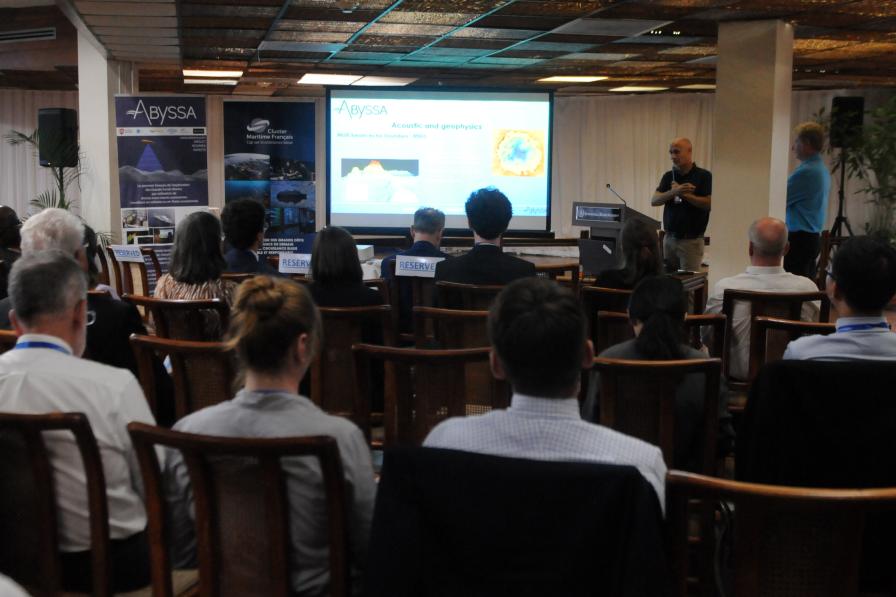“The work of the International Seabed Authority (ISA) is under increased public scrutiny.”
The delegate from ISA’s host country, Jamaica, noted this reality in her opening remarks. She stressed the need to protect the common heritage of humankind, one of the fundamental principles of the UN Convention on the Law of the Sea (UNCLOS), and to ensure the effective protection of the marine environment through the development of adequate and comprehensive rules, regulations, and procedures for deep-sea mining in line with the ISA’s mandate.
Progressing and reaching consensus on the exploitation regulations for mineral resources in the Area (the seabed and ocean floor and the subsoil thereof, beyond the limits of national jurisdiction), is the focus of the second part of the Council meeting for ISA’s 28th session.
In the morning, ISA-28 President Juan José González Mijares opened the Council meeting. He encouraged delegates to remain flexible and attempt to reach consensus, and invited them to continue making substantive progress in the draft regulations, including successfully addressing benefit-sharing provisions.
In his welcoming remarks, Secretary-General Michael Lodge highlighted that this meeting is a “unique opportunity to get the regulations right.” Council members underscored progress made during the previous session and drew attention to important intersessional work on some of the more contentious issues.
Following the election of Rebecca Hitchin (UK), a marine ecologist and international policymaker, to fill a vacant seat in the Legal and Technical Commission (LTC), delegates focused on the draft exploitation regulations in the Open-ended Working Group on the financial terms of a contract.
Olav Myklebust (Norway) facilitated the Working Group’s discussions. He highlighted two issues, addressed intersessionally, that require further work:
- a possible tax/levy on cases of transfer of rights; and
- an equalization measure to address cases where a contractor pays less domestic tax to the sponsor state than the level assumed in the models.
Canada, co-facilitator of the informal group on a possible tax on the transfer of rights, stressed that opinions converged on the need for a profit-sharing mechanism. He noted general agreement on the need to ensure that the clause will be broad enough to take into account all profit-sharing mechanisms and underscored concerns over potential double taxation.
Australia, co-facilitator of the informal group focused on tax equalization measures, shared the main outcomes of the intersessional work, which addressed three possible models for equalization measures to compensate for cases where a contractor has limited obligations under the sponsor state’s corporate income tax.
Richard Roth, Massachusetts Institute of Technology (MIT), presented the financial payment system for deep-sea mining of polymetallic nodules. He reviewed the four financial payment system options: fixed ad valorem, with two variants, using the same rate for all years or a two-stage system; blended profit; and variable ad valorem. He explained the three suggested approaches for equalization measures discussed by the informal group: additional fixed rate royalty; additional profit share; and top-up profit share.
In the ensuing discussion, members and observers addressed, among other things:
- the difficulty in taking decisions under uncertainty based on assumptions and future estimates;
- the differences between conditions in deep-sea mining sites that might lead to differing costs;
- the need for simplicity in the regulations;
- the need for equity in terms of relevant land-based activities;
- the lack of adequate data for responsible decision making, including for estimating the external costs associated with reducing carbon sequestration and marine fauna;
- a system of separate indicators and weighted averages to assess the financial system’s effectiveness; and
- the absence of a benefit-sharing mechanism and the internalization of environmental externalities in the financial model.
In the afternoon, Council members addressed the revised text of the draft regulations on the financial terms of a contract.
On incentives (regulation 63), members engaged in a lengthy discussion on whether to include references to: provision of incentives, including financial ones, to contractors; the standards and guidelines under development; and provision of financial incentives for contractors entering into joint arrangements with the Enterprise.
Some members highlighted the need to respect language included in Articles 11 (joint arrangements) and 13 (financial terms of contracts) of UNCLOS Annex III, while others underscored the need to retain a level-playing field with land-based mining.
On the payment of royalties shown by royalty return (regulation 70), members discussed provisions on the currency used for the payment of royalties as well as the potential for installments where special circumstances exist, with some suggesting the addition of force majeure to reduce legal uncertainty.
Delegates also addressed draft regulations on equality of treatment (regulation 62), the contractors’ obligation to pay royalties (regulation 64), the form of royalty returns (regulation 66), lodging of royalty returns (regulation 68), and error or mistake in royalty returns (regulation 69).
In the evening, ABYSSA, Cluster Maritime Français, hosted a side event titled “Exploring the deep sea with ABYSSA.”
All ENB photos are free to use with attribution. For the 2nd Part of the 28th Annual Session of the ISA, please use: Photo by IISD/ENB | Diego Noguera
To receive free coverage of global environmental events delivered to your inbox, subscribe to the ENB Update newsletter.









































